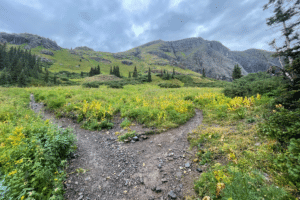As Ms. Gorman’s poem focuses on unity and inclusivity, this lesson outline is meant to include all sorts of families that might gather together for a lesson, whether they be Mormon or not, friends who become family, American or not, and is meant to include all ages who want to feel the Spirit through the emotions that are stirred during the reading of “The Hill We Climb.” Please take what is helpful and provide your own suggestions for a more robust lesson in the comments.
Opening Prayer
Opening Song: “For the Strength of the Hills” (LDS Hymnal pg 35) or pick what moves you from our playlist for this lesson
Introduction to the Author

Start with this video about Amanda Gorman’s background.
- What values do you think she learned from her family?
- Do you think her speech impediment affected her ability to write and perform? Why?
- In this interview, Ms. Gorman says (paraphrased) “poetry can make the ideas that are known, felt and said.” We see poetry used a lot in scripture. Do you have a favorite poem in scripture? How does it illustrate ideas that you know be felt in your heart?
A favorite example of mine is seen Isaiah 1:18 (sins as scarlet becoming white as snow) has touched me ever since I was a six-year-old worried about my sins as I imagined my sins as dark red becoming pure as freshly fallen snow.
Experiencing “The Hill We Climb”
Consider playing this video of Ms. Gorman’s performance at last week’s Presidential Inauguration. It is also helpful to have the transcript as your family discusses.
Feel your feelings
Before playing Ms. Gorman’s performance, ask your family to consider the following questions:
- How do you feel at some parts of this performance? Do your feelings change during this poem?
- How does it feel to see a young black woman read this poem?*
- What makes you uncomfortable about this poem? How does that discomfort sit? How will you take action?
I  played this performance twice for my family. The first time, they watched it; the second time, I had them color this picture (click on image to the right to download the JPG), so they could concentrate on the tone and feeling of the spoken words. In retrospect, I would play the poem again while they colored and have them also consider the anti-racist work questions below.
played this performance twice for my family. The first time, they watched it; the second time, I had them color this picture (click on image to the right to download the JPG), so they could concentrate on the tone and feeling of the spoken words. In retrospect, I would play the poem again while they colored and have them also consider the anti-racist work questions below.
Anti-racist work and discussion
- What does the poem tell us about race and racism in the United States?
- Why is Amanda Gorman highlighting race and racism in this poem?
- What do we need to learn and do to address racism in ourselves?
- What do we need to learn and do to address racism in our community?
- What is one thing that we are going to do this week on our journey to become antiracist?
Light textual analysis
Remember there are no right or wrong answers. This is simply an way to look at the words chosen and think about why they are there.
- What phrases stood out to you? Why? How do they make you feel?
- If “textual analysis” sounds scary, stop here. You’ve already done it!
- Given the title of the poem and where it was being performed, what did you expect this poem to be about?
- What religious images do you see in this poem? Do you think this is intentional?
- suggestions: “dawn,” “lay down arms” (who else has done this in scripture?), “vine and fig tree,” “hill,” “burdens,” “legacy,” “forefathers,” “brave”
- How might the audience impact the message of this poem? How might the moment in time frame it?
- What poem would you write with this title (“The Hill We Climb”)? Who is the “we” and what is the “hill”? Write your own poem to this message and metaphor.
Compare and Contrast “The Hill We Climb” to “For the Strength of the Hills”
- Refer to our opening song.
- What image of hills do you have as you sing “For the Strength of the Hills?” How is it similar or different from the hills Ms. Gorman references in “The Hill We Climb?”
- possible thoughts: both pieces talk about the eternity contained in hills and the generations who came before and after us
- Are there hills (metaphorical or literal) that you climb in your life? What do they look like? How can we as a family “climb” those hills with you and support you?
Closing
Close with your testimony about the importance of unity and accountability. How can we become better as a community? How can we hear each other’s pain and grow? What does unity look like when we often fall into the trap of choosing “quiet” over “peace”?
Closing Song and Prayer
This is a great time to pick your favorite song from our playlist. These songs are full of hope, focusing on unity and God’s love.
This Family Home Evening plan is a team effort. Thank you to my sister, Rachel Clyde-Jones, for creating a coloring page to go with the lesson plan; music selections by my fellow perma-bloggers, Ramona Morris and Nancy Ross; and Nancy again for her inspired questions to further anti-racist work. Also, this plan is based on Kate Steven’s PBS News Hour Extra Lesson Plan for teachers to lead a discussion on Amanda Gorman’s inaugural poem, “The Hill We Climb.”
*As we strive to continue our anti-racist work, it is important to make Family Home Evenings centered around anti-racist work. If this is new for you, like me, Exponent II has a wealth of resources here on our blog and saved on our Facebook Exponent II Discussion Group.






4 Responses
Oh yes!!!! Thanks Emily for this amazing lesson! I’ll be using it with my Activity Days gurlz!!
Fabulous!!
This was timely, thank you. I had to lead my extended family zoom devotional. I used most of your plan.
Thank you so much! We used this for a family FHE and it led to fantastic discussion.